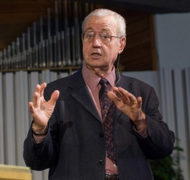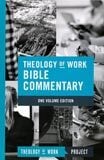Dallas Willard, a Man of Deep Love and Christ-like Character
Blog / Produced by The High Calling
Dallas Willard died today, May 8, 2013, at age 77. His ideas and books about spiritual formation have made a lasting impression on many Christians, including many of the writers here at The High Calling.
Today as a testament to him, we share a few excerpts from articles that would not have been complete without the life's work of Dallas Willard.
Earlier today, Mark Roberts, the author of our Daily Reflections, shared some of his personal memories of Dallas Willard. He concluded,
I have been inspired by Dallas’ example to speak to people with great respect, even when they and their questions or comments bug me. I have thought about Dallas when responding to blog comments that were meant to be unkind as well as critical. I have tried, by God’s grace, to be someone who honors every human being as someone created in God’s image, much as I once saw Dallas Willard do in [a] Sunday School class.
It’s one thing to be a great thinker and writer, a person of significant influence in the church and the world. Dallas Willard was these things, to be sure. But he was also a Christian of deep love and Christ-like character. How thankful I am for Dallas and the way he influenced my life.
Several weeks ago, Skye Jethani concluded his article about calling with the strength of Dallas Willard's words.
It is not the pastor’s task to wrestle more people away from “secular” engagements in order to help him accomplish his “sacred” work, but to erase these categories in the lives of those he leads in order that Christ might come to reign over all parts of their lives and world.
Echoing the Protestant reformers and the Puritans, Dallas Willard recognizes the danger of dividing our work into departments and the destructive illusion it fosters. He says,
“There truly is no division between sacred and secular except what we have created. And that is why the division of the legitimate roles and functions of human life into the sacred and secular does incalculable damage to our individual lives and the cause of Christ. Holy people must stop going into ‘church work’ as their natural course of action and take up holy orders in farming, industry, law, education, banking, and journalism with the same zeal previously given to evangelism or to pastoral and missionary work.”
If we are to embrace this united view then we must advance a new vision for Christian engagement in the world, employ a new model of leadership, and create a new spirit of affirmation that values each person’s specific, Christ-given call within our churches.
Christine Scheller explained what Dallas Willard taught her about Christianity's role in the history of ethics and science.
Willard told me that up until the twentieth century, ethical theory was considered a form of knowledge.
“It was spoken of as a science. Now people think you’re crazy if you speak that way,” said Willard. “Many in the academic context believe ethics and morals are not even the kind of thing that can be true or false, certainly not the kind of thing that can constitute knowledge.”
The postmodern reaction to scientism doesn’t go far enough, he asserted, because it doesn’t say, “There is moral knowledge.” Rather, it says, “What we call the sciences have no right to declare the things that would make up a way of life including morality.” In other words, it only asks what works now in a particular context; it doesn’t ask what works forever in every context.
Image by Loren Kerns, used with permission via Creative Commons.





